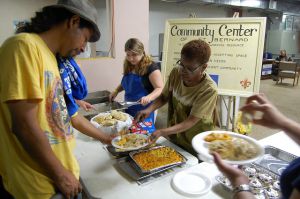 We humans are relational, social beings. Community is an essential part of life. We long for it. Without it life is lonely, boring, and meaningless.
We humans are relational, social beings. Community is an essential part of life. We long for it. Without it life is lonely, boring, and meaningless.
Because community is so important to our existence, we try to create community just about everywhere we go. We refer to our cities as the “[insert your town] community.” We have community churches, community colleges, and community centers. Nearly every business, non-profit, and cause strives to create community among its customers and advocates.
But I think if we’re honest with ourselves, we have to admit that many of the things we refer to as “communities” are really not. Sometimes we slap the word “community” on things in an effort to try to appeal to that longing for community we all have. Sometimes we want community but we aren’t willing to do the hard things to create it. Sometimes we’re simply unaware of what’s needed for meaningful community.
Over on Christian Web Trends I’m leading a group discussion of the book @StickyJesus. Monday’s post was on chapter 3, which talks about 6 essential elements of community:
- Leadership
- Service
- Consistency
- Compassion
- Encouragement
- Inclusiveness
Seiji Yamashita, who wrote yesterday’s post and is leading the conversation asked, “Which of these characteristics of community is most important?”
That got me thinking… one way to better understand how important a certain characteristic is to community is to imagine what a community would be would out it…
1) Leadership. A community without leadership is a meaningless social club. There is camaraderie but no purpose. Eventually, a community without leadership will lose all the other essential characteristics, too, because all of us are naturally self-serving, exclusive, and inconsistent. It takes leadership to make the mission and values of the community clear and to inspire the community to pursue them.
 2) Service. A community without service is self-absorbed. Human beings were created to serve a purpose beyond ourselves. Without service, a community loses its sense purpose. Like an inland sea with no outlet, groups that are all take and no give become stagnant and lifeless. (Think the Dead Sea and the Great Salt Lake). Every vibrant community exists to serve a purpose and other people.
2) Service. A community without service is self-absorbed. Human beings were created to serve a purpose beyond ourselves. Without service, a community loses its sense purpose. Like an inland sea with no outlet, groups that are all take and no give become stagnant and lifeless. (Think the Dead Sea and the Great Salt Lake). Every vibrant community exists to serve a purpose and other people.
3) Consistency. A community without consistency is just a loose association of acquaintances. True friends aren’t hit or miss. They’re not out of sight out of mind. People in meaningful communities are committed to one another.
4) Compassion. A community without compassion is a collection of self-serving individuals. It’s a fraud. Think networking group where everyone views everyone else as nothing more than a prospective client. Think corporate machine where everyone is viewed as a replaceable cog. At its core, meaningful community is people who care for one another. If you don’t really care about the people in your organization you don’t really have a community.
5) Encouragement. A community without encouragement is depressing, conflicted and unhealthy. In meaningful community our joys are doubled and our sorrows halved. Encouragement is how that happens.
6) Inclusiveness. A community without inclusiveness is a clique. It’s a group of people who don’t trust each other to allow others to join them because they fear new people will displace their position in the group. This isn’t community but co-dependency. Inclusiveness is a sign of a meaningful community of people who trust each other and are others-focused.
Those are the 6 characteristics of community included in the chapter 3 of @StickyJesus and discussed in the blog post, but there’s one other characteristic I believe is essential for meaningful community…
 7) Authenticity. A community without authenticity is a fraud. You can’t love and encourage others if you don’t know who they really are. And vice versa… people can’t really love YOU if they don’t know the real YOU. They can’t encourage you if they don’t know the fiercest battles you’re facing. Nothing exposes illusion of community quite like when a person announces they’re getting divorced when everyone thought their marriage was great, a person who announces they’ve lost their house when no one knew they were experiencing financial problems, or worse.
7) Authenticity. A community without authenticity is a fraud. You can’t love and encourage others if you don’t know who they really are. And vice versa… people can’t really love YOU if they don’t know the real YOU. They can’t encourage you if they don’t know the fiercest battles you’re facing. Nothing exposes illusion of community quite like when a person announces they’re getting divorced when everyone thought their marriage was great, a person who announces they’ve lost their house when no one knew they were experiencing financial problems, or worse.
There will always be people who hide their struggles even in the most authentic communities. But meaningful communities get beyond “I’m fine if you’re fine.” They get beyond, “If you won’t tell, I won’t ask.”
Discussion:
1) Which of these characteristics of community resonate most with you?
2) As you look over the communities you’re a part of, which characteristics are lacking?
While the leader of each community is ultimately responsible for instilling these qualities in their community each of us also has the opportunity to raise or lower the bar on these qualities. So, don’t sit back and lament or criticize your community leaders, be a part of the solution.
3) What can you do to raise the level of those characteristics that are lacking?
[images by SMB College, ccstbp]
Fantastic post. Will be tweeting –
To answer your question – authenticity is the one that screams at me. We live in a sound-bite, surfacy, loose connection world these days. Any opportunities to truly be who we are and allowing space for others to be who they are makes a community strong.
Thanks for sharing
Denise, I think authenticity screams out at a lot of people because it’s the missing piece in so many of our attempts at community. It’s up to all of us who recognize this to be as intentional as possible about being authentic ourselves and creating a culture where it’s safe for others to be open about their flaws.
Fantastic topic Paul!
I agree that all 7 need to exist for true community to be realized. But if I had to pick one, it would be ‘encouragement’. Without encouragement life becomes dull and as you said, joyless and without purpose. Bringing out the best in people is what encouragement is all about.
Thanks Karen… for your encouraging comment. 🙂